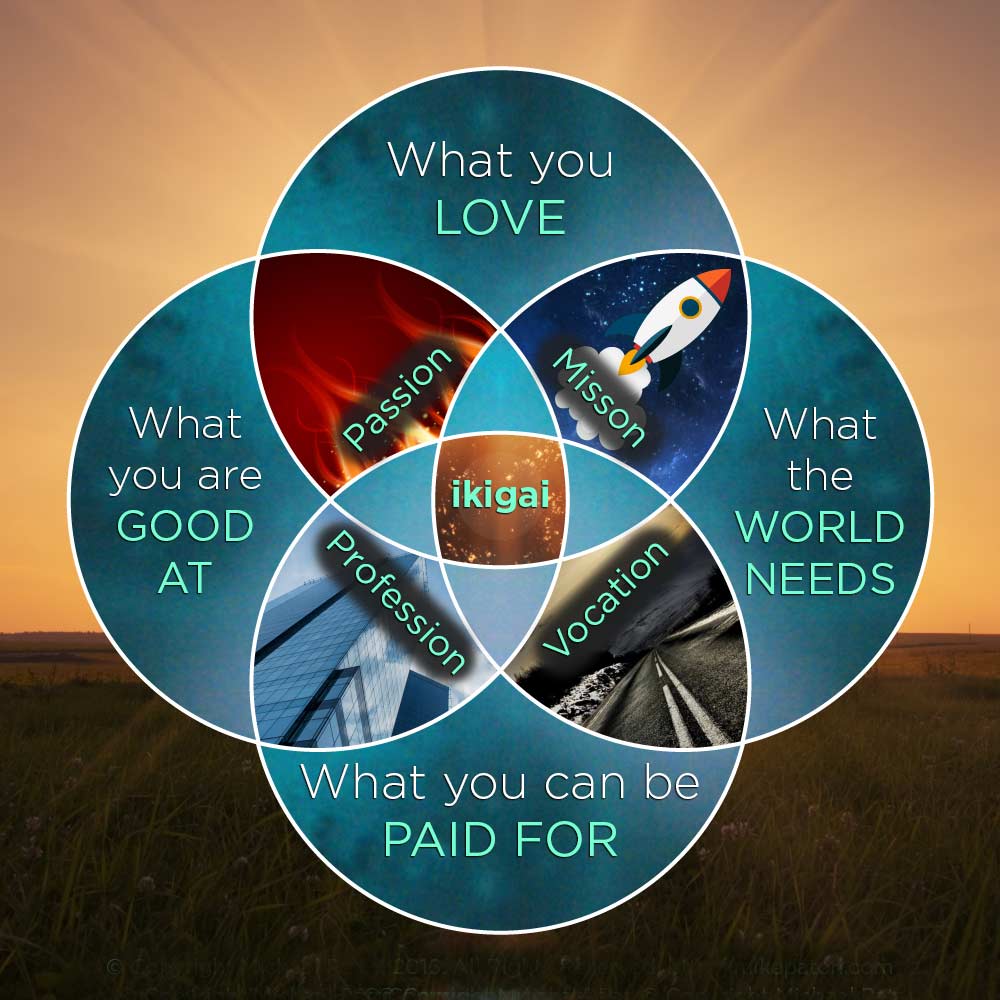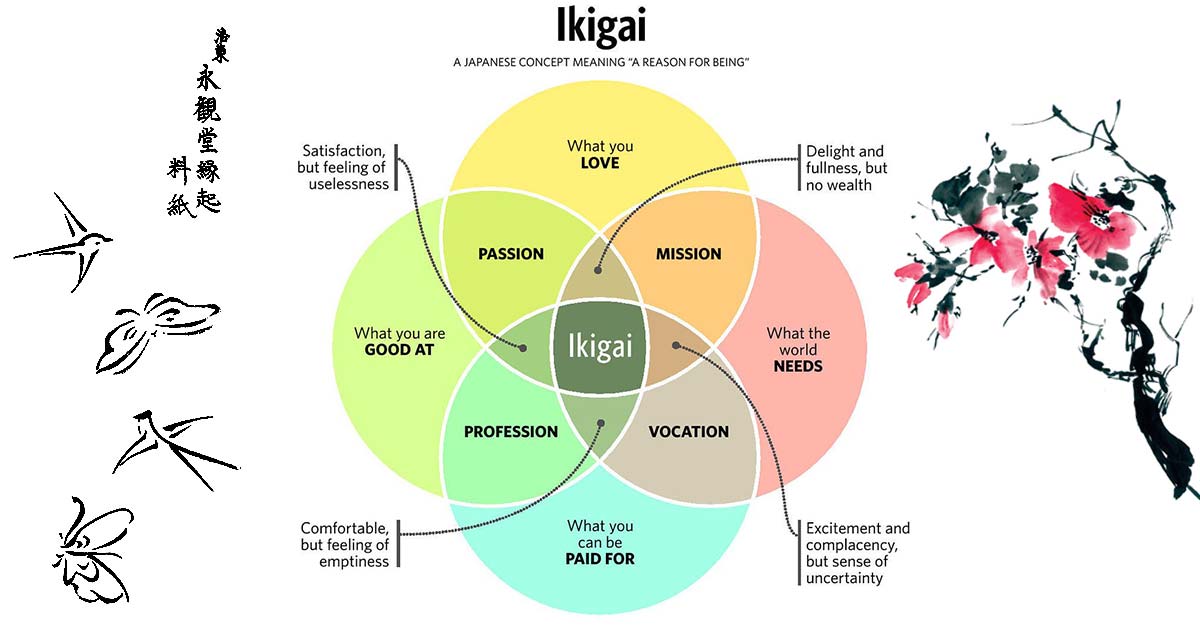What is IKIGAI?
IKIGAI, a Japanese concept, roughly translates to “a reason for being” or “a reason to get up in the morning.” It’s about finding your life purpose, your passion, and what makes life feel meaningful and fulfilling.
Here’s the breakdown of the word:
- Iki: means “life” or “alive”
- Gai: means “value,” “worth,” “benefit,” or “reason”
Together, they create a powerful concept that goes beyond just surviving and existing. It’s about finding what truly lights you up and gives your life direction.
Key Points about Ikigai
- Personal and unique: Your Ikigai is specific to you, your values, your skills, and your experiences. There’s no one-size-fits-all answer.
- Beyond work: While Ikigai can be related to your career, it’s not limited to it. It can also be found in your relationships, hobbies, or simply the way you approach life.
- Living in the present: Finding your Ikigai is not about chasing some distant goal. It’s about appreciating the present moment and finding joy in the things you do every day.
- A journey, not a destination: Discovering your Ikigai is a lifelong process. It may evolve and change as you grow and learn.
Think of it as a quest for that sweet spot where your passion, mission, skills, and vocation intersect. It’s the source of deep satisfaction and a life filled with meaning and purpose.
While discovering your Ikigai takes time and introspection, remembering these key points can guide you on your journey. Remember, the most precious treasure is often hidden within yourself, waiting to be unearthed.
Ikigai Leadership Checklist
This checklist is designed to help you, the aspiring leader, explore your potential for a fulfilling and impactful leadership journey, guided by the principles of Ikigai. Remember, there are no wrong answers. Embrace the journey of self-discovery!
Passions:
- ☐ I thrive on inspiring and motivating others. Seeing individuals and teams reach their full potential brings me immense joy.
- ☐ I’m driven by problem-solving and finding creative solutions. Tackling challenges and forging new paths excites me.
- ☐ I value building strong relationships and fostering collaboration. Creating a supportive and cohesive environment where everyone feels valued fuels my passion.
- ☐ I believe in making a positive impact on the world and leaving a legacy. Leading with purpose and contributing to something bigger than myself motivates me.
Skills and Strengths:
- ☐ I possess strong communication and interpersonal skills. I can connect with diverse individuals, actively listen, and communicate effectively to inspire and guide.
- ☐ I have a strategic mind and can think big picture. I can analyze situations, set goals, and develop actionable plans to achieve them.
- ☐ I’m decisive and can make tough calls when needed. I’m comfortable taking responsibility and leading through uncertainties.
- ☐ I’m adaptable and embrace change. I can adjust strategies, learn from mistakes, and navigate through complex situations with agility.
Values:
- ☐ I believe in integrity and ethical leadership. Setting a good example and acting with honesty are paramount to me.
- ☐ I value fairness and inclusivity. Creating a space where everyone feels heard and respected is essential.
- ☐ I’m committed to continuous learning and growth. I seek feedback, embrace new challenges, and strive to be the best leader I can be.
- ☐ I believe in empowering others and fostering individual growth. My goal is to create leaders, not followers.
Societal Needs:
- ☐ There’s a growing demand for effective leaders in various sectors. From businesses and communities to social causes and international organizations, the world needs individuals who can guide and inspire positive change.
- ☐ Effective leadership bridges divides and promotes collaboration. Leaders who can build consensus, navigate complexities, and lead with empathy are crucial for tackling global challenges.
- ☐ Strong leadership fosters innovation and progress. Leaders who create environments where creativity thrives and new ideas are embraced are key to building a better future.
Conclusion on Leader Checklist
If you checked several boxes in each category, especially those related to inspiring others, motivating teams, solving problems, fostering collaboration, and making a positive impact, it’s a strong indication that you have a natural talent for leadership. Consider exploring this potential further! Seek leadership opportunities, network with other leaders, take leadership development courses, and actively practice your skills. You might be surprised by the impact you can make as a leader, leaving a trail of positive change in your wake.
Ikigai Follower Checklist
While the spotlight often shines on leaders, the world also needs dedicated and impactful followers. This checklist is designed to help you, the aspiring follower, explore your potential for a fulfilling and meaningful journey, guided by the principles of Ikigai. Remember, there are no wrong answers. Embrace the journey of self-discovery!
Passions:
- ☐ I enjoy learning and growing under the guidance of others. I’m eager to expand my knowledge and skills by following experienced individuals.
- ☐ I thrive in collaborative environments and appreciate teamwork. Contributing to a shared vision and supporting others’ goals motivates me.
- ☐ I have a strong sense of loyalty and commitment. I believe in supporting leaders and causes I trust and admire.
- ☐ I value stability and security, and find comfort in following a clear path. Knowing my role and contributing to a larger team brings me satisfaction.
Skills and Strengths:
- ☐ I’m a reliable and dependable individual. Leaders can count on me to be responsible, follow instructions, and meet deadlines.
- ☐ I have a strong work ethic and am dedicated to my tasks. I put in my best effort and strive to excel in my role.
- ☐ I’m a team player and value collaboration. I communicate effectively, work well with others, and contribute to a positive team dynamic.
- ☐ I’m adaptable and willing to learn new things. I can adjust to changing circumstances, embrace new challenges, and learn from my leaders and colleagues.
Values:
- ☐ I value trust and respect in my relationships. Following leaders I admire and learning from their wisdom is important to me.
- ☐ I believe in contributing to a larger purpose and making a positive impact. Being part of something bigger than myself motivates me.
- ☐ I value humility and understand that everyone has something to teach me. I’m open to feedback, willing to learn from others, and appreciate different perspectives.
- ☐ I embrace continuous learning and growth, even within a support role. I seek opportunities to develop my skills, expand my knowledge, and become a better follower.
Societal Needs:
- ☐ Effective teams require dedicated and supportive followers. Strong followership skills are crucial for smooth operations, project completion, and achieving organizational goals.
- ☐ Followers play a vital role in spreading positive influence and leading by example. By supporting ethical and impactful leaders, followers contribute to a better society.
- ☐ Strong followership skills can be valuable in diverse contexts, from businesses and communities to social movements and international organizations. The ability to support and contribute within a larger framework is essential for collective progress.
Conclusion on Follower Checklist
If you checked several boxes in each category, especially those related to learning from others, supporting leaders, contributing to teams, embracing collaboration, and valuing stability, it’s a strong indication that you have the potential to be a valuable and impactful follower. Consider exploring this path further! Seek opportunities to learn from mentors and leaders you admire, contribute actively within teams, and practice your followership skills. You might be surprised by the difference you can make by supporting others and contributing to a shared vision.
Lear More About IKIGAI
IKIGAI isn’t just about whether you’re a leader or a follower—it’s about finding the real purpose of your life. Forget titles and roles. Curious for more? Find additional details by reading below.

IKIGAI: The Four Pillars of Your Awesome Life
Imagine your life as a sweet, juicy burger (don’t worry, vegetarians, we can swap it for a falafel wrap later!). Ikigai, the Japanese secret sauce for a fulfilling life, tells you the key ingredients for the most delicious, satisfying bite. Buckle up, because we’re diving into the four pillars that hold up your Ikigai burger:
- What you love: Discovering your passions and what brings you joy.
- What you are good at: Recognizing your strengths and talents.
- What the world needs: Identifying societal needs and how you can contribute.
- What you can be paid for: Finding opportunities to turn your passions into a livelihood.
Take these four pillars, mix and match them like a pro chef, and find that sweet spot where they all overlap – boom, that’s your Ikigai! It’s not about finding the perfect one-size-fits-all burger, it’s about crafting a delicious life that’s uniquely yours. So, get creative, experiment, and don’t be afraid to take a bite out of life with gusto! Remember, your Ikigai burger is waiting to be built, one delicious layer at a time.
Finding Your Ikigai
Ikigai isn’t just a fancy word for “hobby”; it’s the secret sauce to a life swimming in personal fulfillment. It’s about striking that perfect balance between your inner world and the outer world, where your passions dance with societal needs. Imagine life as a teeter-totter: on one side, the joy of pursuing your talents and passions, on the other, the satisfaction of contributing to something bigger than yourself. Finding your Ikigai is like nailing the sweet spot on that teeter-totter, where both sides soar, leaving you breathless with joy. This inner harmony isn’t just feel-good fluff; it’s a potent dose of mental well-being.
Studies show that Ikigai can reduce stress, boost resilience, and even lengthen your lifespan! So, if you’re yearning for a life that whispers “meaningful” and explodes with “fulfilling,” step onto the Ikigai teeter-totter and prepare to take flight.
Bonus: Cultivating Your Ikigai: A Practical Roadmap for Purposeful Living
Finding your Ikigai, that elusive reason for being, isn’t just a whimsical pursuit; it’s a journey towards a more fulfilling and purposeful life. To help you navigate this path, here are some practical steps you can implement:
1. Self-Discovery: Unveiling Your Inner Compass
- Reflect on your passions: What lights you up? What activities make you lose track of time and fill you with joy? Jot down your passions, no matter how big or small.
- Identify your skills and strengths: What are you naturally good at? What skills come easily to you? Consider feedback from others and your own experiences.
- Explore your values: What drives your decisions? What principles are important to you? Understanding your values helps you align your actions with your core beliefs.
- Visualize your ideal life: How do you want to feel? What kind of impact do you want to make? Creating a vision board or simply writing down your aspirations can serve as a guiding light.
2. Aligning the Elements: Building Your Ikigai Framework
- Draw your Ikigai diagram: Divide a square into four sections: passion, mission, vocation, and profession. Fill each section with elements identified in your self-discovery journey.
- Find the sweet spot: Where do your passions, skills, values, and societal needs intersect? That’s your Ikigai, the sweet spot where fulfillment and purpose converge.
- Remember, it’s a dynamic process: Your Ikigai might evolve as you grow and learn. Don’t be afraid to refine your framework as you navigate life’s twists and turns.
3. Putting Ikigai into Action: A Roadmap for Living with Purpose
- Start small: Don’t try to overhaul your life overnight. Choose one or two aspects of your Ikigai to focus on initially. Maybe incorporate a new passion into your daily routine or volunteer your skills for a cause you care about.
- Seek inspiration: Find like-minded individuals who share your Ikigai. Participate in communities, workshops, or mentorship programs to gain support and learn from others on their own journeys.
- Celebrate progress: Don’t wait for monumental achievements to feel good. Acknowledge and celebrate even small steps towards your Ikigai.
- Embrace challenges: Setbacks are inevitable, but they are also opportunities for growth. Use them to learn, adapt, and refine your approach.
- Continuously learn and explore: Never stop evolving! Learn new skills, experiment with different activities, and keep an open mind to new possibilities.
Remember:
- Finding your Ikigai is a journey, not a destination. Enjoy the process of exploration and discovery.
- Trust your intuition and listen to your inner voice. Your Ikigai lies within you, waiting to be unearthed.
- Be patient and kind to yourself. Cultivating a life of purpose takes time and effort. Celebrate every step on your path to Ikigai.
Conclusion
As we conclude our exploration of Ikigai, let’s reflect on the profound impact it can have on our lives. The journey to purpose and fulfillment is unique for each individual, and Ikigai serves as a timeless guide. May you find inspiration in your quest for meaning and embrace the transformative power of living in alignment with your Ikigai.
FAQs
1. Is Ikigai only relevant for career decisions?
A: No, Ikigai extends beyond career choices; it encompasses all aspects of life, guiding decisions that contribute to overall fulfillment.
2. How long does it take to discover one’s Ikigai?
A: The timeline varies for each person. It’s a journey of self-discovery that unfolds at its own pace.
3. Can Ikigai change over time?
A: Absolutely. Ikigai is dynamic, evolving with your changing passions, strengths, and life circumstances.
4. Is Ikigai a spiritual concept?
A: While it can have spiritual undertones, Ikigai is fundamentally a practical philosophy focused on finding purpose and joy in everyday life.
5. Can Ikigai be applied to group settings, such as workplaces or communities?
A: Yes, the principles of Ikigai can be adapted to collective settings, fostering a sense of purpose and collaboration.




